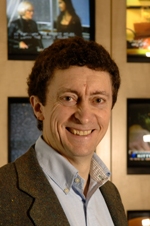
DERMOT O’CARROLL WON’T HAVE any issues settling into a retirement rhythm this week from his 17-year engineering run at Rogers Cable, most recently as SVP Access Networks.
He’s already a (very) active kayaker, karate practitioner (fourth degree black belt), bicyclist, and photographer. Three years ago, he began studying Italian, and on vacation last summer, his conversational skills were so strong, a Tuscan bicycle storeowner asked him if his parents were Italian.

O’Carroll, 60, is decidedly Irish, as was his (beekeeper) father and mother before him. Raised in Donegal, on the northwestern coast of Ireland, he studied electrical engineering and electronics in Dublin. “I graduated on a Friday, and got married on a Saturday,” he says of his longtime love Breda, with whom he idolizes three daughters – Sorcha (32), Aoife (29) and Aisling (26).
A yin/yang kind of guy, O’Carroll (pictured) collects Samurai swords, and studies poetry – on his office wall hangs a framed poster, showing photographs of a dozen famous Irish writers.
And this is all before he steps into the “every day is Saturday” scene.
From Whence He Came
In ’74, he joined Bell Canada, building fibre links between central offices and putting in digital switches. In ’89, he joined Unitel – a company then 30% owned by Rogers – and came into contact with cable engineering veteran Nick Hamilton-Piercy, and Ted Rogers himself. O’Carroll came to Rogers full-time in 1995, charged with rebuilding the MSO’s plant to 860 MHz, and lighting up the upstream/reverse signal path.
Colleagues routinely describe O’Carroll as a sensible, clear-headed engineer: “He’s just a really pragmatic operator and technologist – he led Rogers through several transitions, including DOCSIS 3.0 and switched digital video,” said Tony Werner, CTO of Comcast Corp. “We’re all going to miss him.”
“He’ll take a highly complex problem, and very quickly identify the core issue, and move things forward,” notes Ed Miller, SVP/Cable 3.0 for CableLabs. “Plus, he’s a super-interesting person to be with – he can talk martial arts, technology, travel, cultures, even esoteric topics like relativity and time travel.”
Others describe O’Carroll’s love for network reliability: “Hearing him talk about the care and feeding of the HFC network is like listening to him talk about one of his own children,” says Marwan Fawaz, principle of Sarepta Advisors and a former CTO (Adelphia, Charter) colleague of O’Carroll’s. “He’s also an excellent sounding board, to weed out practical solutions from wishful ideas, when it comes to technology.”

(Fawaz and O’Carroll [right] share a sort of “CTO doppelganger” connection, often mistaken for each other by vendors at trade shows. “We’ve jokingly played it through a few times, on hapless vendors who get us confused,” Fawaz laughs.)
Yvette Gordon-Kanouff, EVP/engineering and software design for Cablevision, chronicles O’Carroll’s work ethic with this anecdote: She called him on his cell one day. A typical work conversation ensued. Ultimately, she asked him where he was. “’Oh, I’m in a pub in Ireland, on vacation,’” she recalls him saying. “How many people would answer a work call from their vacation overseas, and never even mention it? That’s class.”
Core Philosophies
O’Carroll holds two philosophies as core: One, that a company’s (or person’s) greatest strength is also its greatest weakness. “If you get too process-oriented, and forget that process is there to facilitate work – then process gets in the way of work. Conversely, if you’re overly technical and architectural, and forget process, you’re weakened. There has to be a balance, between process and technology.”
And then there’s the matter of network scale, which O’Carroll views as one of the bigger issues facing network operators today. “Whether it’s the combining network, or switching capacity, or IP network capacity, it’s a big challenge to anticipate scale…if you hit that wall, things can go wrong fast.”
Enter O’Carroll’s second major theory. It goes like this: Every time network load increases by an order of magnitude, a fundamental change is required – either in process or technology — to handle it.
Which says a lot, given that the industry’s network load has doubled every two years since the mid-2000s. “If you double it every two years, you increase by an order of magnitude in less than four years – and that’s happened almost twice,” in his Rogers lifetime.
What He’d Fix About Canadian Cable
If he could fix one thing about Canadian cable, he’d bring back the core collegiality that tends to get sidetracked with longer to-do lists. “I don’t think we share ideas the same way as we used to,” not for any nefarious reason, but because “we’re just busy doing our own things … I think it’s a pity.” (And it’s partly why he started the SCTE Canadian Summit, in Toronto, three winters ago.)
Why retire at 60? “The next 10 years are the most important in my life,” O’Carroll explains. “There’s stuff you can do, between 60 and 70, that you can’t do, between 70 and 80.”
On the near-term retirement horizon: A trip to France, with his brood plus those of two (of seven) siblings, this summer. Plus, he’s putting the blarney on Breda for a return trip to Italy, this fall. “For now I’m focused on taking a few months off,” then will decide if and when to return to cable engineering, he says.
From us to you, Dermot: Slainte mhor agus a h-uile beannachd duibh! (And we really, really hope this translates to “good health and every blessing to you!”)
Leslie Ellis is owner of Ellis Edits Inc. and Translation-Please.com, a Denver-based analysis/writing firm specializing in the technologies used in cable, multichannel and broadband delivery systems. Specific focus is "translating" the dense language surrounding the technologies and technology strategies of service providers, and particularly cable service providers.



